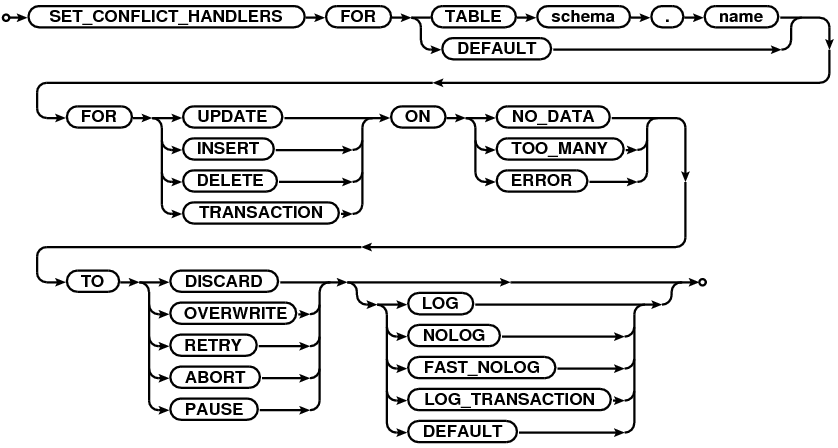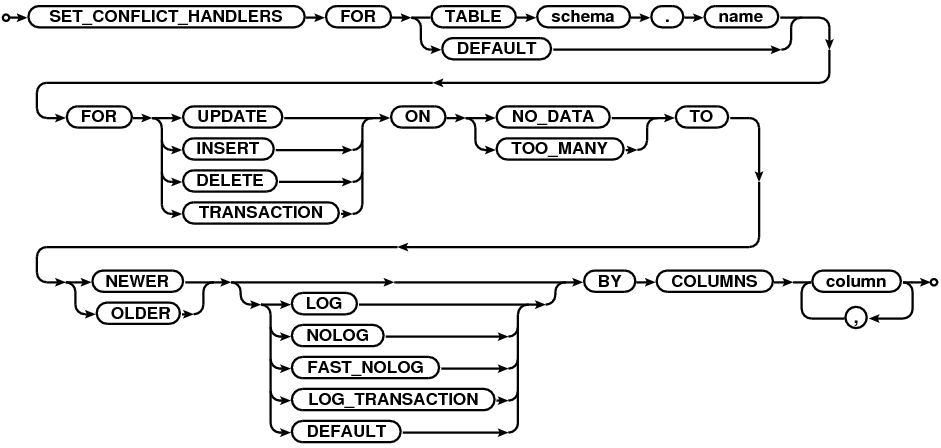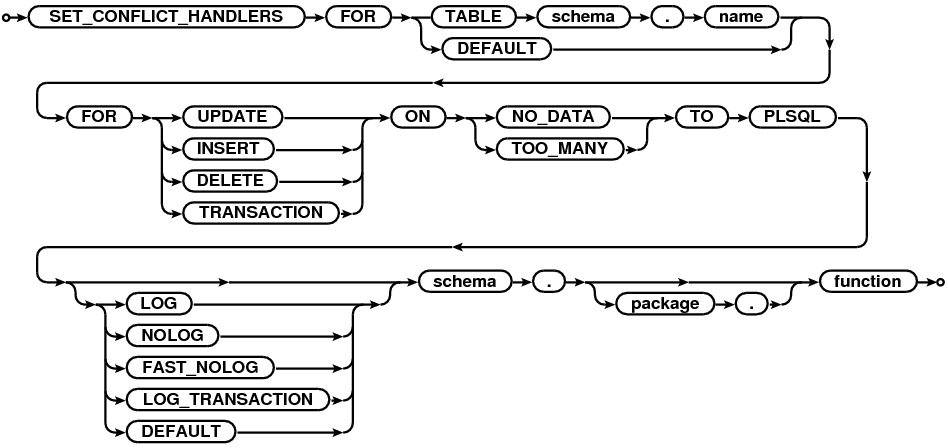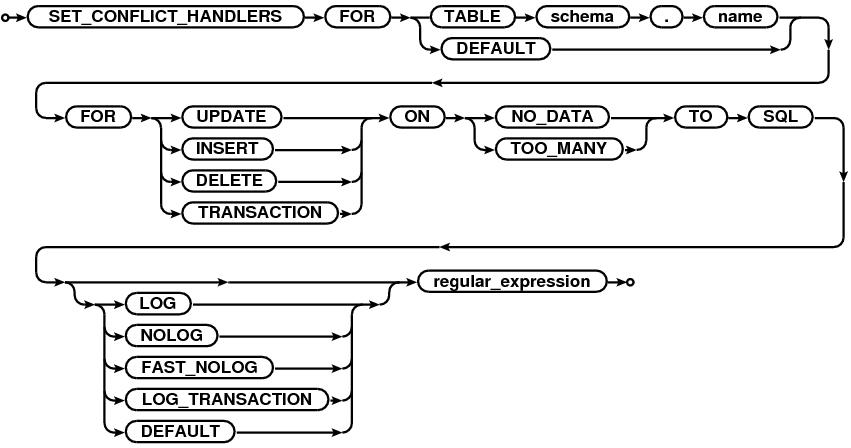
All keywords are case-insensitive.
If a command works directly with mine/apply/fetcher (not by process name), you have to choose your process by "CHOOSE" command. (This is not needed in simple configurations with only one mine/apply as this happens automatically).
The syntax diagrams in this document use a variation of Backus-Nauer Form (BNF), a convention familiar to any reader of Oracle documentation and many other documents. Emphasis and symbols have the following meaning in this version of BNF syntax.

Shows general help, help for specific command or help for a variable.

Reads the designated file like it would be entered at command prompt. As with SQL*Plus, both "@file" and "@ file" work.

Read the specified DDC file. Same as command line option "--ddcfile file", which is preferred, as READDDC is from interactive prompt sets some variables too late to be effective (e.g. STATUSBAR).

Execute command in a new shell.

Connects to mine and apply (and fetcher if configured). Checks that they see each other.

Sets configuration variable in memory and DDC DB. This setting will be permanent. See memory_set for setting in memory only and which are not permanent.

Unsets variable for a specified process, falling back to general non-process-specific setting.

Sets configuration variable in memory only. Use for variables that cannot be set in the DDC DB or if you want the value to be valid for short time only. After restart of the process the setting will no longer apply (unless MEMORY_SET is specified in the DDC file).

Unsets variable, in memory only.

With no parameter or with ALL, shows all configuration variables, as they are seen by current process. It does not reread DDC file nor DDC DB to update the settings.
With variable, shows variable value. (For * and also for all processes.)

Connects to database and lists registered redologs / plogs.

Show tabular overview of mine/apply records processed and conflicts. You can optionally specify a schema to filter the results to a particular database schema (this is source schema if renaming is used). Use ALL to see everything including Dbvisit Replicate internal tables.

Show list of prepared tables. You can optionally specify a schema to filter the results to a particular database schema (this is source schema if renaming is used). Use ALL to see everything including internal tables.

Obtains a list of obsolete archived redo log files that are not needed by Dbvisit Replicate anymore and therefore maybe deleted.

List the current conflict(s). This information is obtained from Dbvisit Replicate internal table DBRSAPPLY_CONFLICT_LOG on the apply side.

Exits dbvrep.

Waits until killed.

FILE: Parses given online/archive redo, generates plog and parses the plog. (Note that to generate traces etc. during query mode, you still have to set the corresponding configuration variables.)
In query mode, incomplete plog will generate only an error, not a fatal error.
Note that this is a local API command, so you have to see the redo log on local filesystem.
No changes are actually applied to apply database.
PLOG: Parses selected plog (usually a conflict error plog) – either by specifying a filename, or by conflict id.
In query mode, incomplete plog will generate only an error, not a fatal error.
Note that this is a local API command, so you have to see the error-log on local filesystem, and have to be able to connect to apply database to query metadata if using conflict id.
No changes are actually applied to apply database.
CONFLICT: If error plogs are enabled (disabled by default), tries to get error plog for given conflict id and run QUERYMODE PLOG on that file.

Ignored. Just a comment, useful in scripts.
Note that if the # character is used, it must be preceeded by a space (" #"). If there is no space, it is considered part of the command, thus tables with # in their name can be used (e.g. "PREPARE TABLE SCOTT.TEST#").
![]()
Starts the setup wizard.

Shows Dbvisit Replicate version. Can be also invoked by --V switch.


Prepares a schema/table for replication and declares that their content is in sync as of now. If a schema is prepared and DDL replication is enabled, new tables created in this schema in future will be also prepared and replicated. By default, this command connects to running apply and mine and instructs them to replicate the schema/table. If OFFLINE is used, apply/mine will pick the new tables on the next start. Use OFFLINE if the apply and mine are not running, as some network configurations may cause long timeouts while PREPARE tries to connect to the apply/mine. By default, DDL replication is enabled. Use NODDL to disable it (mandatory for non-Oracle databases). RENAME clause makes the replication to apply the changes to the given schema/table at apply. Note that the RENAME TO clause requires the NODDL option. |

Unprepares a schema/table for replication and declares that this object should no longer be replicated. This will only take affect after a restart of the mine process.


Set a column to be excluded/included in mining. Use this if you don't want to replicate a specific column(s).
Note that PREPARE automatically includes all columns and EXCLUDE thus must follow the prepare.

Shows current license, as set by LICENSE_KEY variable.
The optional FULL keyword specifies the verbosity of the command:
|

Choose process to work with. This process has to be defined in DDC file (process_name.PROCESS_TYPE).

Asks the given process to pause.

Asks the given process to resume.

Starts process.

Connect to mine/apply/fetcher and request it to shut down.
ALL means requesting all processes defined in DDC to shut down.

Request mine/apply to dump debug information to log.
DUMP ALL is invoked automatically when exiting due to a untrapped fatal error.
DUMP ALL can be also invoked by sending SIGUSR2 (kill -12) to the process (not available on Windows).

PROGRESS: Asks APPLY to reset conflict counters.
CONFLICT: Asks MINE and APPLY to reset progress counters.




Gets object id as of current mine progress and sets conflict handlers for this table (schema.name refers to current table name at mine).

Shows current setting of conflict handlers for given table (schema.name refers to table at mine).

Contacts apply and resolves current conflict.

Clear console screen.


Create DDL for create or drop given table or all tables in a given schema. The output can be to screen (print), to file (spool) or directly executed (replicate). This is used if ddl_run is used as instantiation type in setup wizard.

Sends sample email/SNMP trap – use to test your SMTP/SNMP configuration.

Create Windows service for given process.

Delete Windows service for given process.

Start Windows service for given process. Same as Windows command NET START.

Encrypts the password, so the value can be used in the DDC file, where all passwords are stored encrypted.
 Upgrade the Dbvisit Replicate repository to a newer version.
Upgrade the Dbvisit Replicate repository to a newer version.
![]() Downgrade the Dbvisit Replicate repository to an older version.
Downgrade the Dbvisit Replicate repository to an older version.